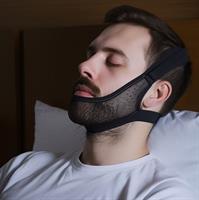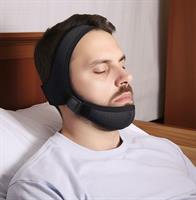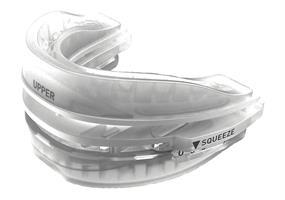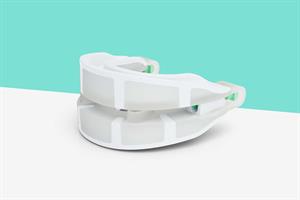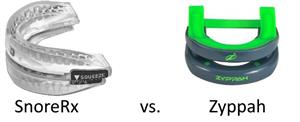Snoring and sleep apnea can be more than just a nuisance. They can affect your quality of life, relationships, and even your health. Fortunately, numerous solutions are available to help you breathe easier and sleep better. Two popular options are chin straps and mouthpieces, but which one is right for you?
In this blog post, we will dive into the world of snoring chin strap vs. mouthpiece, comparing their effectiveness, safety, and potential side effects. By the end, you will be equipped to make an informed decision on the best treatment option for your needs.
Key Takeaways
-
Chin straps and mouthpieces are devices used to reduce snoring and sleep-disordered breathing.
-
Mouthpieces have been proven more effective than chin straps for treating mild to moderate sleep apnea, but both should be considered when creating a tailored treatment plan.
-
Consult with a medical professional before use due to potential safety risks and side effects of these treatments as well as lifestyle modifications that may improve overall well-being.
Understanding Chin Straps and Mouthpieces
Chin straps and mouthpieces are both utilized for the treatment of snoring and sleep apnea. These devices work differently, but they share a common goal: to improve your sleep quality by reducing snoring and sleep-disordered breathing.
A snoring chin strap is a fabric strap that hooks on the chin with adjustable straps that secure around the head, while snoring mouthpieces are designed to reposition the jaw to facilitate improved airflow during sleep. Chin straps are generally crafted from a flexible fabric or neoprene-type material, and they serve the purpose of keeping the mouth closed to avoid snoring.
On the other hand, snoring mouthpieces, also known as Mandibular Advancement Devices (MADs), prevent the mouth from falling open and reposition the jaw to improve airflow during sleep. Keep in mind, although helpful in managing snoring, chin straps are not recognized as an effective treatment for sleep apnea.
How Chin Straps Work
Chin straps are fabric straps designed to keep the mouth closed during sleep, thereby reducing mouth breathing and snoring caused by rapid flapping of soft tissues.
Patients with obstructive sleep apnea may struggle to keep their mouth closed during positive airway pressure therapy. To address this issue, specialized mouth guards are used to help keep the mouth shut.
By securing the mouth in a closed position during sleep, chin straps reduce the airflow-related vibrations that cause mouth breathing and snoring.
However, numerous patients with snoring (but without sleep apnea) have attempted to use a chin strap without achieving the desired results. A 2007 study revealed that a single patient with sleep apnea experienced resolution of their symptoms with the use of a chin strap.
For an anti-snore chin strap to be effective and comfortable, it’s advisable to wear it as snug as possible without causing discomfort.
How Mouthpieces Work
A Mandibular Advancement Device (MAD) is a mouthpiece for snoring that prevents the mouth from falling open while sleeping. By repositioning the jaw, MADs facilitate improved airflow during sleep and help reduce snoring and sleep apnea symptoms.
The most effective MADs involve advancing the lower jaw to amplify the volume and size of the airway behind the tongue, while concurrently limiting the amount of mouth opening during sleep.
Mouthpieces are generally safe when used correctly and with proper fit. However, temporary discomfort, excessive salivation, and jaw soreness may occur. Before using any device to treat sleep-disordered breathing or snoring, it’s advisable to seek advice from a medical professional, as individual needs and tolerance can vary.
Effectiveness: Chin Strap vs Mouthpiece
When it comes to treating snoring and sleep apnea, the effectiveness of chin straps and mouthpieces is a critical consideration. While chin straps have been observed to reduce snoring by 50-95%, studies have shown that they are not effective in treating sleep apnea and may even exacerbate airway obstruction.
On the other hand, clinical studies have demonstrated that mouthpieces are more effective than chin straps in reducing snoring and treating mild to moderate sleep apnea. Mouthpieces work by preventing the mouth from falling open and repositioning the jaw to improve airflow during sleep, making them a more suitable option for those who suffer from sleep apnea.
Remember, while chin straps can lessen snoring, they’re not seen as a standalone solution for sleep-disordered breathing and snoring. Consulting with a sleep-trained professional and considering all treatment options is essential for achieving optimal results and improving sleep quality.
Chin Strap Effectiveness
Chin straps may reduce snoring by 50-95%, which can be beneficial for those looking to improve their sleep quality. However, it is essential to understand that chin straps are not effective in treating sleep apnea and may even worsen airway obstruction.
Research has indicated that chin straps may be ineffective for snoring treatment. Furthermore, a study conducted by Bhat et al. determined that chin straps had no value in the treatment of sleep-disordered breathing and snoring.
Therefore, while chin straps may provide some relief for snoring, they are not a suitable option for treating sleep apnea.
Mouthpiece Effectiveness
Mouthpieces have been found to be more effective in treating snoring and sleep apnea than chin straps. Clinical evidence supports the use of mouthpieces in reducing snoring and treating mild to moderate sleep apnea.
Mouthpieces work by:
-
Preventing the mouth from falling open
-
Repositioning the jaw to improve airflow during sleep
-
Reducing snoring
-
Improving sleep quality
As a result, mouthpieces are a more suitable option for those who suffer from mild sleep apnea and are seeking an effective treatment option.
Combining Chin Straps and Mouthpieces
While both chin straps and mouthpieces can be used individually to address snoring and sleep-disordered breathing, there may be potential benefits to using them together for improved sleep quality and reduced snoring. Combining chin straps and mouthpieces has been found to be effective in treating sleep-disordered breathing and snoring, as they can complement each other and address different aspects of the issue.
Always remember, a chin strap alone isn’t considered a sufficient remedy for sleep-disordered breathing and snoring. However, when used in conjunction with a mouthpiece, a chin strap can provide additional support and enhance the effectiveness of the treatment.
Consulting with a sleep-trained professional is recommended to determine the most appropriate combination of treatment options based on individual needs.
>> Check out SnoreRx Plus, our favorite snoring mouthpiece! <<
Safety and Side Effects
Just like any treatment option, considering the safety and potential side effects of using chin straps and mouthpieces for snoring and sleep apnea treatment is a must. While chin straps and mouthpieces are generally safe when used correctly, there are potential risks associated with their use, such as jaw soreness, lightheadedness, and headaches.
Proper fit and quality are essential to avoid health and safety issues when using chin straps and mouthpieces. Before using any device to treat sleep-disordered breathing or snoring, it’s crucial to consult a sleep-trained professional, as individual needs and tolerance may differ.
Chin Strap Safety and Side Effects
Chin straps are generally safe, but there are potential side effects and safety concerns to consider. Jaw soreness, lightheadedness, and headaches can occur with chin strap use, especially if the strap is not properly fitted or is of poor quality.
To guarantee a proper fit and quality, users should ensure the chin strap is made of a breathable material, fits securely but not overly tight, and is adjustable. It is important to discontinue use of a chin strap if it amplifies snoring rather than mitigating it, for safety considerations.
Mouthpiece Safety and Side Effects
Mouthpieces may cause temporary discomfort, excessive salivation, and jaw soreness, but they are generally safe when used correctly and with proper fit. However, potential risks include mouth cuts and abrasions, increased risk of infection, and the possibility of jaw pain.
To reduce potential side effects of mouthpieces, one needs to assure proper fit and adjustment, and seek advice from a medical professional before using any device to treat sleep-disordered breathing or snoring. This will help to ensure that the mouthpiece is effective and safe for the individual user.
Choosing the Right Treatment Option
Choosing the ideal treatment option for snoring and sleep apnea is a crucial decision, directly affecting your sleep quality and overall well-being. Factors to consider when choosing a treatment option include the severity of snoring or sleep apnea, personal comfort, and the presence of other health conditions.
A personalized approach to treatment, including consultation with a clinical sleep medicine professional, is recommended for optimal results. By taking into account individual needs and preferences, the most suitable treatment option can be identified, ensuring improved sleep quality and reduced snoring.
Factors to Consider
When assessing the intensity of snoring or sleep apnea, one should take into account the frequency and intensity of snoring, the existence of sleep apnea, and the outcomes of a sleep study. In addition, personal comfort should be considered, including factors such as the size and shape of the device, the material used, and the ease of use.
One should take allergies, asthma, and other respiratory conditions into account when deciding on a treatment plan. This ensures that the chosen treatment option is not only effective but also safe for the individual user.
Personalized Approach
A personalized approach to treating snoring may involve addressing the underlying snoring sounds.
Snoring solutions:
-
Lifestyle modifications, such as weight loss and positional therapy
-
The use of custom-fitted oral appliances such a mouthpiece made to reduce snoring
-
Continuous positive airway pressure (CPAP) therapy
Consulting with a doctor to identify the most suitable treatment option based on individual needs and tolerance is vital.
Implementing lifestyle modifications such as abstaining from alcohol and caffeine before bed, sleeping on one’s side, and maintaining a healthy weight may help to improve sleep quality and reduce snoring. Combining these changes with a suitable sleep medicine treatment option can enhance the overall effectiveness of the chosen treatment plan.
Additional Treatment Options and Lifestyle Changes
Apart from chin straps and mouthpieces, other treatment options for snoring and obstructive sleep apnoea include Positive Airway Pressure (PAP) therapy and surgery. PAP therapy is a type of treatment that utilizes a machine to deliver air pressure through a mask that is worn during sleep, helping to maintain the airways open and reduce sleep-disordered breathing.
Surgical procedures such as uvulopalatopharyngoplasty (UPPP), laser-assisted uvulopalatoplasty (LAUP), and radiofrequency ablation (RFA) are also available for snoring and sleep-disordered breathing.
In addition to these treatment options, lifestyle changes such as weight loss, positional therapy, and abstaining from alcohol and sedatives before bedtime may prove beneficial in reducing snoring.
Summary
In conclusion, both chin straps and mouthpieces can be viable options for addressing snoring and sleep-disordered breathing. While chin straps may provide some relief for snoring, they are not effective in treating sleep apnea.
On the other hand, mouthpieces have been clinically proven to be more effective in reducing snoring and treating mild to moderate sleep apnea. A personalized approach to treatment, including consultation with a sleep-trained professional, is essential in determining the most suitable treatment option based on individual needs and preferences.
By considering all available treatment options and making lifestyle changes, you can improve your sleep quality and enjoy a more restful night’s sleep.
Frequently Asked Questions
Do chin straps really help with snoring?
Chin straps alone have been found to be ineffective in treating snoring. A 2014 study found that they did not ease snoring and a conclusion by the Journal of Clinical Sleep Medicine suggested that chin straps are not an effective treatment for Obstructive Sleep Apnea (OSA) either.
Do chin straps work for mouth breathers?
Chin straps may help CPAP users who tend to breathe through their mouth when wearing a nasal mask or pillow. However, they are not an effective treatment for sleep apnea on their own, and may not be necessary for everyone who uses a CPAP.
What is the best thing to stop snoring?
To stop snoring, try sleeping on your side, wearing a nasal strip or dilator, using an anti-snoring mouthpiece, reducing body weight, practicing mouth exercises, quitting smoking, avoiding alcohol before bed, and trying laser-assisted uvulopalatoplasty.
Are there any anti snoring devices that actually work?
SleepTight Mouthpice and SnoreRx Plus are two great anti-snoring devices that have been found to be effective in helping users reduce snoring. They both feature adjustable mouthguards and a money-back guarantee, making them reliable options for those suffering from snoring.
Both devices are designed to be comfortable and easy to use, and they have been proven to be effective in reducing snoring. The adjustable mouthguards allow users to customize the fit of the device to their own mouth, ensuring a comfortable and secure
Can chin straps and mouthpieces be used together?
Yes, chin straps and mouthpieces can be used together for treating sleep-disordered breathing and snoring.
References
- Treatment of Severe Obstructive Sleep Apnea Syndrome with a Chinstrap. National Library of Medicine. https://www.ncbi.nlm.nih.gov/pmc/articles/PMC2556917/
- Use of a Chinstrap in Treating Sleep Disordered Breathing and Snoring. https://www.ncbi.nlm.nih.gov/pmc/articles/PMC4237533/
- The Efficacy of a Chinstrap in Treating Sleep Disordered Breathing and Snoring. https://www.ncbi.nlm.nih.gov/pmc/articles/PMC4106943/
